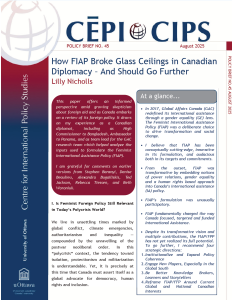- Home
- How FIAP Broke Glass Ceilings in Canadian Diplomacy – And Should Go Further
How FIAP Broke Glass Ceilings in Canadian Diplomacy – And Should Go Further
![]() Full text (pdf)
Full text (pdf)
By Lilly Nicholls
CIPS Policy Brief, August 2025
At a glance…
- In 2017, Global Affairs Canada (GAC) redefined its international assistance through a gender equality (GE) lens. The Feminist International Assistance Policy (FIAP) was a deliberate choice to drive transformation and social change.
- I believe that FIAP has been conceptually cutting-edge, innovative in its formulation, and audacious both in its targets and commitments.
- From the outset, FIAP was transformative by embedding notions of power relations, gender equality and a human rights based approach into Canada’s international assistance (IA) policy.
- FIAP’s formulation was unusually participatory.
- FIAP fundamentally changed the way Canada focused, targeted and funded International Assistance.
- Despite its transformative vision and multiple contributions, the FIAP/FPP has not yet realized its full potential. To go further, I recommend four strategic directions:
- Institutionalize and Expand Policy Coherence
- Engage New Players, Especially in the Global South
- Be Better Knowledge Brokers, Learners and Storytellers
- Reframe FIAP/FFP Around Current Global and National Canadian Interests
 Dr. Lilly Nicholls is a retired Canadian diplomat who is presently a Professional In Residence at the University of Ottawa’s School of International Development and Global Studies. She served as ambassador of Canada to Panama from 2018 to 2021 and as Canadian High Commissioner to Bangladesh since 2022. She has a PhD in International Development from the London School of Economics and 30 years of experience in international affairs. Her career has spanned 6 continents and includes leadership roles in government, international organizations and civil society in various positions. From 2015 to 2018, she contributed to the consultations on, and the formulation of, Canada’s Feminist International Assistance Policy.
Dr. Lilly Nicholls is a retired Canadian diplomat who is presently a Professional In Residence at the University of Ottawa’s School of International Development and Global Studies. She served as ambassador of Canada to Panama from 2018 to 2021 and as Canadian High Commissioner to Bangladesh since 2022. She has a PhD in International Development from the London School of Economics and 30 years of experience in international affairs. Her career has spanned 6 continents and includes leadership roles in government, international organizations and civil society in various positions. From 2015 to 2018, she contributed to the consultations on, and the formulation of, Canada’s Feminist International Assistance Policy.


